On a hot afternoon in north London, three incarnations of Alan McGee are sitting within a few yards of each other.
One is him aged around 17, clad in a big-collared shirt and grey flares, and about to have his world transformed by the Sex Pistols. Another version, played by the Scottish actor Ewen Bremner – best known as Spud from Trainspotting – today represents his 20s, and suggests a lost member of the Velvet Underground, complete with Breton shirt, leather jacket, shades and the appearance of someone who could sorely do with some sleep.
The third is the real thing. The 60-year old is paying one of his occasional visits to the set of Creation Stories, the film (very) loosely based on his 2013 autobiography of the same name, which tells the story of both his life and that of the independent record company he co-founded in 1983 and then piloted through a rollercoaster 16 years in which he worked with Oasis, Primal Scream, My Bloody Valentine and more.
Coronavirus and lockdown, which will mean that Creation Stories will be released via TV rather than cinemas, are still nine months away. Sitting on a fold-out chair amid cables and cameras, McGee talks about watching the film’s progress unfold with an air of wry amusement. In the house outside of which we’re sitting, rooms have been turned into three of his life’s key locations: his family’s Glaswegian living room, his teenage bedroom, and a small-scale mock-up of Creation Records’ final offices in Primrose Hill, north London. “It’s all psychedelic,” he tells me. “I only come down here occasionally, for an hour or two. But when I was down last Tuesday, seeing what Ewen was doing, I was watching this guy being me – he had become me.”
Bremner, whose in-character channelling of McGee is indeed uncanny, says he knew “almost nothing” about McGee and Creation before he took the role. “We’ve spent a little bit of time together since then. And he’s been very open – I know he can pick his enemies, but he’s been very good to me. Some of the producers chaperoned our first meeting, and they were a bit nervous about whether he’d take to me or not. So I was a bit cautious. And I was sensitive about probing anything that might be too deep or painful.” He pauses. “But it’s not a documentary. It has a kind of licence to enjoy the absurdity of it all.”
It took about four years to get Creation Stories to this point. The first person to sign up to the project, McGee explains, was Irvine Welsh, who agreed to co-write the screenplay. In a further Trainspotting link, that film’s director, Danny Boyle, became executive producer. But the person charged with finally bringing Creation Stories to fruition was its director, Nick Moran, who first came to public attention when he played the lead role in Guy Ritchie’s Britpop-era film Lock, Stock and Two Smoking Barrels. He was recruited thanks to his superlative direction of Telstar, the 2008 film he made about the visionary, tragic record producer Joe Meek.
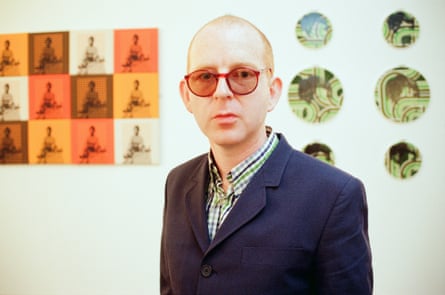
Between them, Welsh and Moran take the basics of McGee and Creation’s rise and use them to also trace two decades of pop-cultural history. Their story begins in 1970s Glasgow, where McGee dreams the same essential dreams as his close friend Bobby Gillespie, later of Primal Scream. It then follows McGee to early 1980s London, where he works as a clerk for British Rail while laying the ground for Creation by running a club night called The Living Room.
After the label takes off, McGee eventually embraces the hedonistic wonders of acid house, before selling half of Creation to Sony under pain of insolvency. Everything then reaches its climax with the success of Oasis, McGee’s brief period as a prominent supporter of Tony Blair’s Labour party, and his decision to fold Creation in 1999. Along the way comes the event on which the film turns: the chemically triggered breakdown that began on a trip to Los Angeles in early 1994, and meant that McGee viewed a chunk of his label’s most successful phase from the distanced perspective of rehab and recovery.
The latter might suggest some kind of morality tale about excess, but Welsh’s script and Moran’s direction are not like that at all. Although the film has many moments that feel moving and intimate, it also emphasises what is surreal, absurd and completely fictional – so much so that that the reality of McGee’s LA episode is replaced by a completely invented set of events built around an aristocratic “faux-film producer” called Ralph, and a reality-twisting sojourn in a crackhouse. “That’s just Irvine,” McGee shrugs. “But I’ve not asked him to change a thing. I’ve just let him get on with it.”
For McGee, the key real-life theme that runs through the film is how far he travelled from his upbringing to where he subsequently arrived. “I suppose it’s a celebration of the ordinary working-class person who breaks through – and, against all the odds, actually succeeds,” he says. “I don’t think that happens now, unless you win the lottery or something. The doors got closed. And do you know what opened those doors? Punk rock. It meant people were able to get through, and go where they wanted to go.”
When I have lunch with Moran in a cafe close to the set, he echoes the same point. “We’ve been breeding royal stock and wealthy people in this country for century upon century so that they don’t go potty. But with Alan, he builds this empire, and all of the belligerence and the drive and the tenacity that help him do it become the things that push him to breaking point.” Like most good music stories, it’s basically Faustian, isn’t it? “Absolutely. It’s a real-life Faustian story, and it’s a film about recovery. It certainly isn’t a film about Oasis. A bit like Telstar, it’s a film about how music is a power and how Alan is an alchemist: he takes funny noises and turns them into gold.”
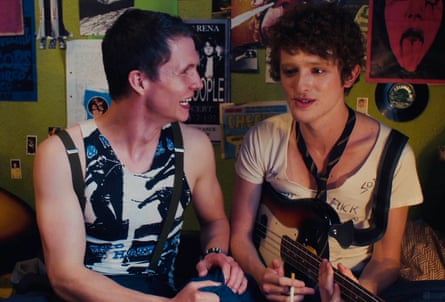
There are four cornerstones to the film’s music. One is provided by the Television Personalities, the anarchistic cult band who formed in the late 1970s, and whose arrival in McGee’s world with their 60s reference points and punk energy set Creation’s basic template. They give way to the Jesus and Mary Chain, whose debut single Upside Down, released on Creation, and riotous early gigs gave McGee his first real taste of how music could fuse with uproar and controversy. Soon after come the Anglo-Irish band My Bloody Valentine (now seen as pioneers of so-called “shoegaze”, but so much more than that), who entranced McGee, only to nearly bankrupt him. And then Oasis, whose brazen ambition to make it big made them very different from most Creation signings, and whose success soon rendered the term “independent” all but meaningless.
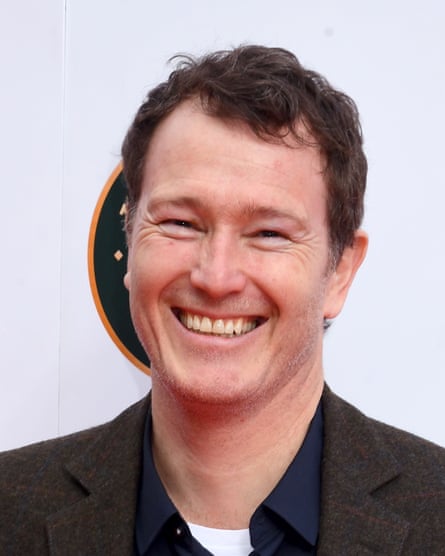
Whatever the rest of the film’s relationship with actuality, the music, Moran insists, is brought to the screen with as much authenticity as possible. “On this film, some people have turned up thinking, ‘Oh, you don’t need to be able to play the guitar to play this role,’” he tells me. “And I’m like, ‘Oh, great – now I have to sit someone down and show them how to do it and try and make sure they look right.’ But luckily I’ve been able to cast a few people that can really do it.”
One of Moran’s favourite sequences is built around My Bloody Valentine’s You Made Me Realise, the 1988 song whose live versions were soon distinguished by a long section of mind-boggling noise known to make people faint. “We worked really, really hard on that. And that was such a fantastic surprise for the audience – for everybody. The actors played live, and they were brilliant. It made everybody in the room fall in love with My Bloody Valentine: the cast, the extras, the crew. I just let the cameras run and it became this fantastic mosh.”
Around the music and McGee himself, there swirls an often surreal supporting cast. There are portrayals of the Sex Pistols manager Malcolm McLaren, a toothy and oleaginous Blair, Peter Mandelson and Alastair Campbell. There is also a brief and very unsettling appearance by Jimmy Savile – who, around 12 years before his final posthumous exposure, was among the dinner guests when McGee and his wife Kate were invited by Blair to Chequers, the prime minister’s country retreat. But as an illustration of how the film rearranges aspects of McGee’s biography to push things into the fantastical, perhaps the most striking cameo is that given to Aleister Crowley, the infamous occultist, writer, artist and long-standing source of fascination to musicians and their associates.
Crowley is the basis of Moran and Bremner’s belief that the film is partly about something akin to magic and alchemy. Played by Steven Berkoff, he appears as an apparition, advising McGee to “let go of your past, [and] stay on the path you have chosen” to “finally achieve greatness”. And in the film’s closing moments, McGee is glimpsed in what looks like a wizard’s costume, apparently casting spells.
This material is based based on his post-Creation interest in an occult practice known as “chaos magic”, which flowered when he lived, for a while, in rural mid-Wales. “I was into it for about 10 years,” McGee tells me. “I had this big house that was on a ley line. That’s why I moved there. I was a house-dad, and I was doing lots of magic.” Did it work? “Arguably, yeah. I don’t really get involved in it now. But when I was doing a lot of prescription drugs, it made a lot of sense.”
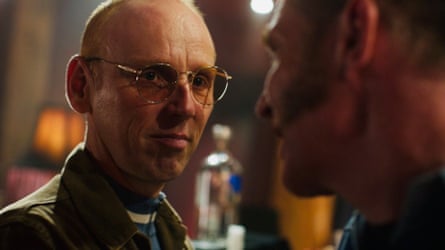
At this, he laughs like a drain. What did he take from it? “Well, I think it’s all possible.” Anything? “Yeah. I got into Crowley first, but chaos magic was what I was really into. It’s kind of post-punk magic.”
This, it seems, is as much as McGee is going to give away. He then reaches for his phone, and talks me through an array of photos of the film’s cast. “That’s me with the Mary Chain – they’re good,” he says. A swipe. “Here’s the Valentines. Pretty good.” Another swipe. “That’s Yvonne, my first wife…”
Is it ever difficult being reimmersed in his own life? “Well, I don’t really regret any of it, if I’m being honest. I know I should, but it was great. Coming from the background I came from, I was expected – at best – to become a taxi driver. And that didn’t happen, and now they’re making a movie about me. So you’ve got to just embrace it. You know what I mean?”
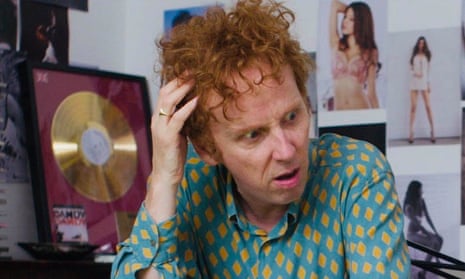
Comments (…)
Sign in or create your Guardian account to join the discussion